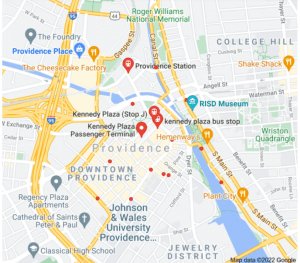
Report follows six months of public meetings and presentations hosted by the Pension Working Group
From The City of Providence:
Mayor Jorge Elorza and the Providence City Council today received a detailed report from the Providence Pension Working Group, outlining the group’s findings, including a series of recommendations for how to most effectively address the City’s unfunded pension liability.
The City of Providence currently has one of the lowest-funded pension plans in the nation, the result of years of insufficient action to address the problem. As noted in the report, in the last twenty years, the City’s unfunded liability increased by nearly $810 million and the City has limited options to meaningfully address its largest obstacle to affordability and sustainability.
“The City’s pension system remains one of the greatest fiscal challenges faced by the City, even as we have continued to improve our fiscal outlook in other areas of governance,” said Mayor Jorge Elorza. “I thank the Pension Working Group for their dedication to understanding the city’s unfunded pension liability challenges and recommending a path forward, and I particularly want to thank the Providence Foundation, Greater Providence Chamber of Commerce and RIPEC for providing recommendations to the City Council and my Administration. My team and I look forward to putting these findings into action to leave the City in a better place for future administrations for years to come.”
“I appreciate the efforts of the pension working group to explore options to reduce the City’s unfunded pension liability. The City Council will accept their report on Wednesday during a special Council meeting and hear a presentation on recommendations to help solve our pension problems. The numbers don’t lie, and the hole will only get deeper with time if we do not take action. When considering a $500 million pension obligation bond, I would stress the importance of a fixed interest rate and consistent payments equal to what the city currently pays to accelerate debt reduction. Any new strategy we explore should include placing financial governors (or guardrails) on future City Councils and administrations to keep the payments steady throughout the years,” said Council President John J. Igliozzi (ward 7).
The Pension Working Group made several primary findings through this process, noting that incremental changes implemented throughout past administrations have helped with the unfunded liability, but have not been sufficient to make the system sustainable and affordable, and that the City has limited options remaining to effectively address the pension system’s challenges. The Working Group also found that not taking action is not an option, as doing so would jeopardize the retirement security of plan members as well as the City’s ability to provide City services in the future. A recommendation to highlight from the Pension Working Group acknowledges that Providence should receive state legislative and city voter authorization to issue a pension obligation bond sized to deposit $500 million into the ERS if advantageous borrowing conditions and terms are met.
Currently, the City’s pension expenses are growing at over 5% while revenue is growing at 2%. The Working Group determined that while smaller or larger bond issues could result in positive benefits, the most efficient transaction size is one that deposits $500 million into the employee retirement system (ERS). This allows the City to best position itself to increase the funded status of the ERS and match associated POB debt repayment costs to the City’s conservative, realistic projection of revenues – and enhance budget sustainability. This proposal would lower the projected growth of pension expenses to 2%, matching the projected revenue growth and therefore fixing the long-term structural deficit.
The Pension Working Group makes four primary recommendations as a result of its findings:
1. The City should not consider bankruptcy, as it is able to meet its current financial obligations and its fiscal outlook is improving.
2. The City should request non-binding state legislative and city voter authorization to issue a pension obligation bond.
3. In addition to pursuing a POB, the City should continue to look for opportunities to reform retiree liabilities through collective bargaining.
4. The City should continue and expand its strong fiscal stewardship to continue to meet its current and future obligations with positive annual operating results.
PVDPensionWorkingGroup_Jan312022








Comments